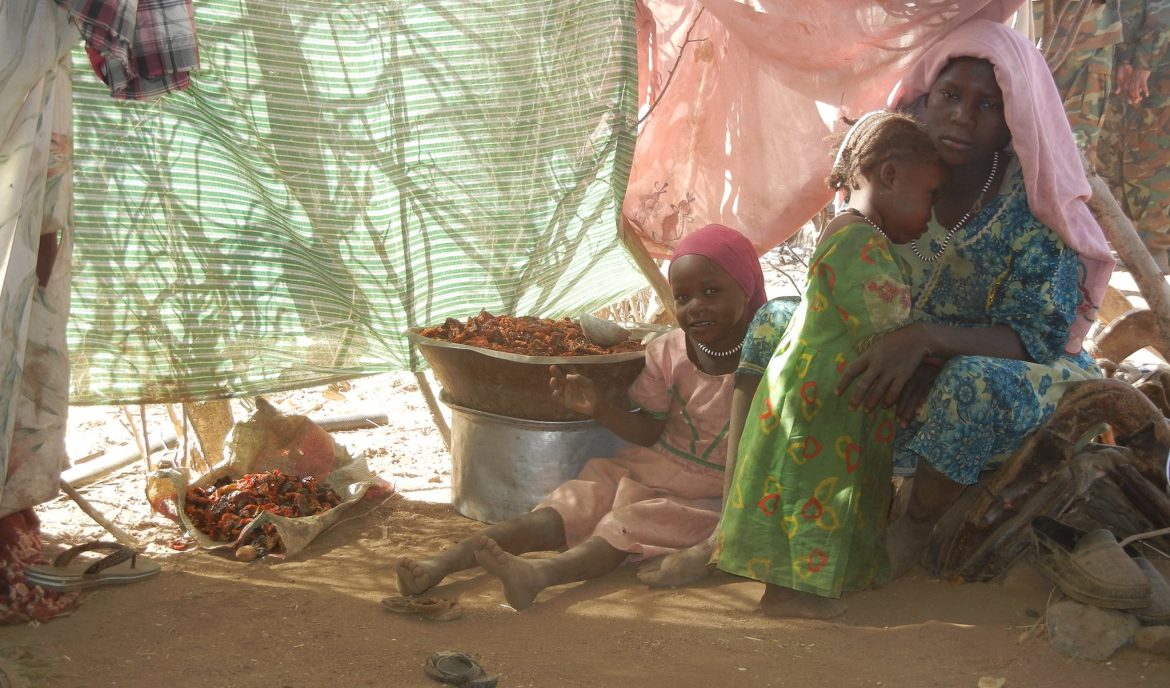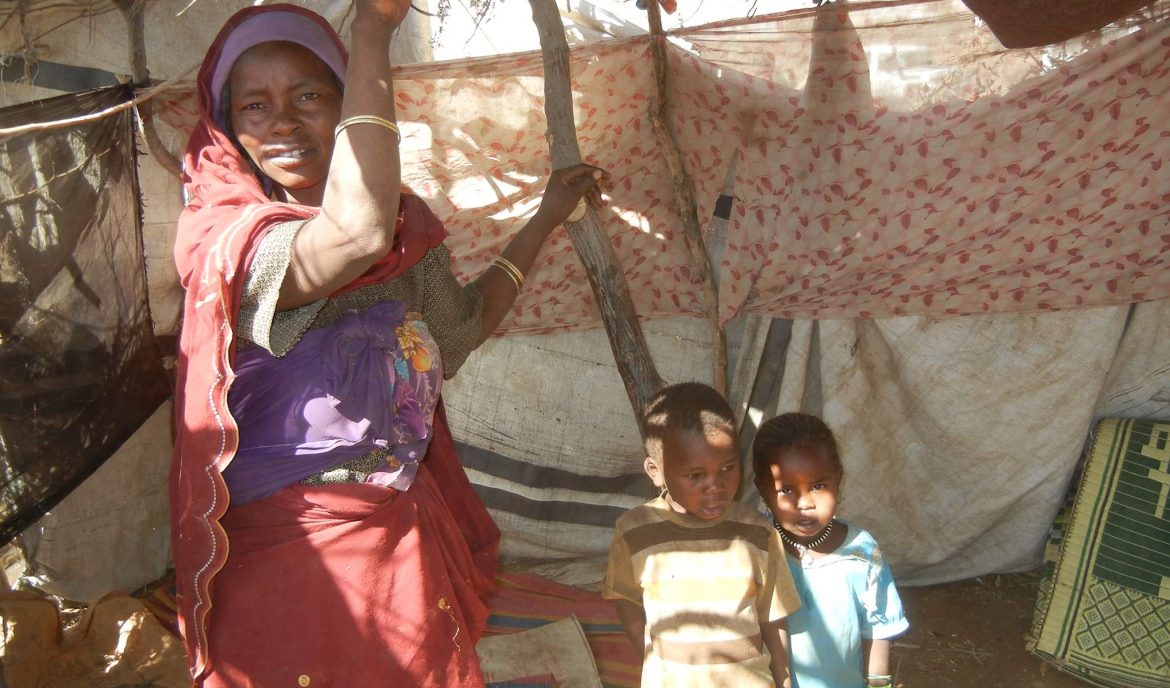On 18 April the tripartite committee formed by the United Nations, the African Union and the Sudanese government convened once again to discuss the exit strategy for the international peacekeeping force from Darfur, Sudan. Last year, the committee agreed on the withdrawal of the mission’s troops from parts of Darfur although the decision has yet to be politically endorsed. Officially, the mandate of the mission will end in two months, but renewed violence in the region and widespread displacement has raised many questions about their planned departure.
An upsurge in conflict erupted this year between rebels and the government in Darfur, leading to an estimated 133,000 displaced from the central Darfur region of Jebel Marra alone.
“I have been here for 11 years and people from Tawila are still coming to the IDP (Internally Displaced Persons) camps because of the conflict,” said Omer Nagi, displaced by the war since 2005 from his home village, Tawila, North Darfur State. Nagi, a father of eight, is even more concerned about his family since he heard news that the international peacekeeping force is expected to leave the embattled region this year. “I just don’t understand why they are leaving, it is better to have them here because there is still insecurity, the war didn’t finish –so why now?”
The force, the United Nations African Union Mission in Darfur (UNAMID), was formed after a United Nations (UN) Security Council resolution in 2007 to establish a joint peacekeeping mission between the supranational bodies, making it the first hybrid peacekeeping mission in the world. Prior to UNAMID, the African Union spearheaded the mission as the African Union Mission in Sudan (AMIS) from 2004. The peacekeeping mission’s mandate came to an end last June but was renewed for another year.
It is not the first time Sudan has called for UNAMID’s exit. In 2014, the government pushed for UNAMID to leave after making inquiries into an alleged Sudanese troops mass rape of 200 women in Tabit village, northern Darfur. “These forces came to protect the rebellion and not the citizen,” President Omar Bashirsaid in an October 2014 press conference. “We now need a clear program for the exit of UNAMID forces.”
Bashir may have personal reasons to reject UNAMID’s presence. The president associates UNAMID with the UN Security Council’s referral of the Darfur situation to the International Criminal Court (ICC) in 2005. This referral led to the war crime charges against him, news reports said. Bashir has also made repeated pledges to “crush” the Darfur rebellion this year, relying heavily on an unruly militia, the Rapid Support Force, to carry this out. The ruling party are keen to cloak militia-related activity from the international community, especially since foreign relations with western actors appears to be improving with recent funding and support of government peace initiatives.
“UNAMID’s departure will have a huge impact –not when it comes to protecting civilians, but in bringing attention to Darfur,” said Abdel-Rahman Gasim, a leading figure in the Darfur Bar Association. Sara Abdallah*, a paralegal in an IDP camp in Al-Fashir city, agrees. “With the UN being here, the world still remembers us from time to time, but if they leave, who will remember Darfur and the war that never finished?”
Over twenty Sudanese civil society groups and leaders called for a renewal of UNAMID’s tenure in Sudan last month, according to a letter submitted to the AU Commission. The signatories of the letter fear UNAMID’s departure will exacerbate human rights violations and hide violations from the international community perpetrated by government forces.
The signatories are also urging that the peacekeeping force needs to negotiate for a stronger mandate, allowing more authority to protect civilians. “A stronger mandate for UNAMID should, among other things, allow the mission to move freely in the region whenever there is a need to investigate human rights violations or take action with regard to them,” said Nasredeen Abdulbari, a Sudanese lawyer currently at Georgetown University Law Center. “Freely here means that it should not be required to get approvals from the Sudanese government as long as the mission does not act beyond its mandate.”
But others, including a former UNAMID commander, believe the mission is costly and ineffective in its current form. With an annual budget of US$1.35 billion, UNAMID is the second largest peacekeeping mission in the world. The commander says an evaluation of the mission needs to take place since this review may reveal that funds spent on peacekeepers could be put to better use elsewhere.
Like other peacekeeping missions, UNAMID has largely failed to protect the civilians it is mandated to serve. In 2013, the mission allegedly allowed an armed group to kidnap IDPs from a bus convoy they were meant to protect, according to news reports.
UNAMID’s former spokesman, Aicha Al-Basri, says UNAMID has not only failed to protect civilians, but also occasionally omitted to report human rights violations that were made known to them.
But given the restraints, blaming UNAMID outright may not be fair criticism.
A hands-tied hybrid force
Al-Basri said that Sudanese authorities routinely blocked UNAMID access to restive areas. “The government refused the UNAMID access 150 times in 2012 and the same amount in 2014,” Al-Basri said. Instead, the peacekeeping force was reduced to wait around for the victims of the conflict to be forcefully displaced into camps, she added. “Even in those camps the government wasn’t allowing the UN to have free access as they should.”
Speaking to the press in Khartoum on April 4, UNAMID Head Martin Uhomoibhi called on the government to allow UNAMID “freedom of movement and access for humanitarian actors to reach vulnerable populations […] particularly in those areas of Central and South Darfur that have not yet been visited.”
While former UN secretary general Kofi Annan introduced the “responsibility to protect” concept for peacekeeping forces in 2000, carrying out these proposals on the ground is another matter. This is particularly true in Sudan where the state constitutes the main perpetrator against its citizens.
According to UNAMID Spokesperson Ashraf Eissa, Sudan is different from other peacekeeping missions such as Liberia where the UN mission took over and rebuilt the state and its institutions. “Sudan is a sovereign state with a government, police force, an army, a functioning state infrastructure. In this case, Sudan as a state has the responsibility to protect its civilians,” Eissa said.
In fact, the agreement between the UN and the Sudanese authorities requires the government to protect peacekeepers. This gives them control over the peacekeepers, Al-Basri said. “They’ve been using this card, saying ‘no you can’t run, we are responsible for your security and you are not allowed to go this way.’”
Flawed from the Start
Observers who worked for UNAMID in its early days agree that the first hybrid mission was not supposed to be established within the realm of such a complex conflict, former UNAMID lawyer M.K* said. “Running a hybrid AU / UN mission was an experiment and led to it having a flawed foundation so there was a limit to what it can do.”
When AMIS was deployed with a force that eventually grew to 7,000, the African Union had no substantial experience in operating large-scale peacekeeping missions or the resources. “They were not well-equipped and lived like IDPs (Internally Displaced Persons),” M.K. said. Even its preface as a peacekeeping force observing a ceasefire was moot since there was no peace to keep upon entry in 2004.
When the mission was transformed into UNAMID, the new hybrid force was predominantly made up of diverse African forces with limited resources –including varied weaponry capacities, M.K. said.Inevitably, this led to increased troop vulnerability to attacks by government forces that could disproportionately outgun them.
Despite a potentially flawed foundation among other limitations, most displaced Darfur residents still want UNAMID to stay. “Yes we can say that UNAMID has failed to protect us,” concedes IDP Haroun Dehya from Zamzam IDP camp, North Darfur. “They are not protecting us by the gun, they are protecting us with their pens as they keep our issue alive.”







